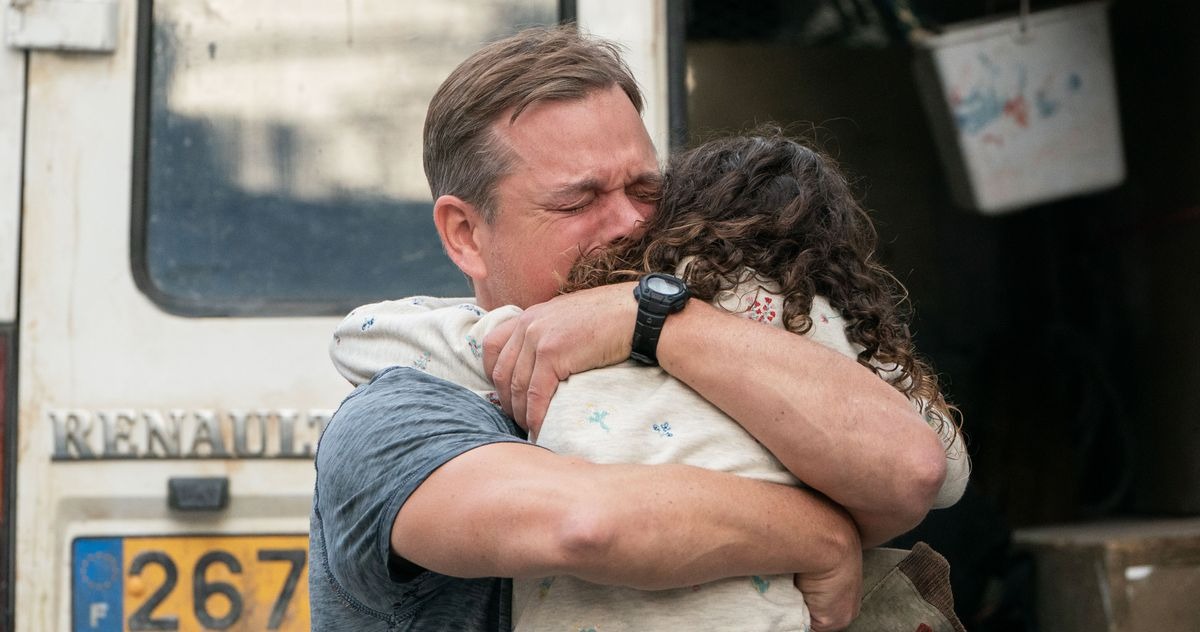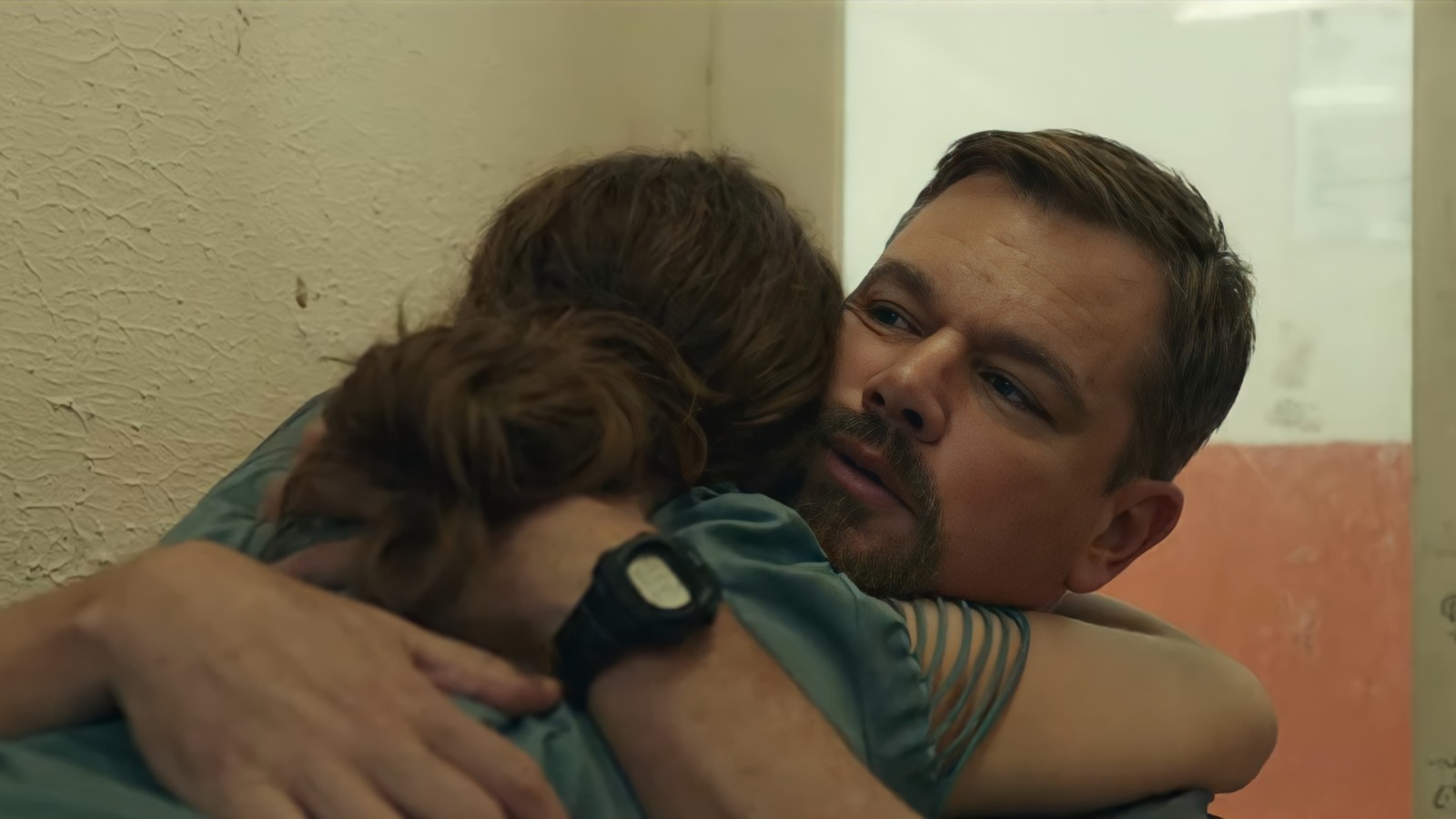True crime dramas often command attention, especially when they involve shocking incidents that make headlines. Some of these stories are picked up by streaming platforms such as Netflix, Amazon, and Hulu, where documentaries thrive.
However, filmmakers in Hollywood occasionally turn such real-life cases into gripping cinematic thrillers. A fitting instance of this is the 2021 film “Stillwater,” featuring Matt Damon.
This movie takes creative liberties while drawing loose inspiration from the case surrounding Meredith Kercher’s death, a crime that initially implicated Amanda Knox, an American exchange student, before it was attributed to a burglary gone wrong.

Matt Damon portrays Bill Baker, a blue-collar oil worker whose daughter, Allison (played by Abigail Breslin), has been found guilty of killing her ex-girlfriend Lina while on a study trip overseas.
Allison is five years into a nine-year prison term when Bill visits her in France. Upon learning about possible new evidence that could change the outcome of the case, Bill takes it upon himself to help his daughter clear her name and regain her freedom.
From the plains of Oklahoma to the vibrant city of Marseille, France, Bill finds himself in unfamiliar surroundings and must depend on the kindness of a local woman named Virginie (Camille Cottin) to continue his efforts.
As a film that focuses heavily on character development, “Stillwater” maintains a steady pace until its final part delivers an unexpected and intense change. For those who watched the movie, the conclusion left many pondering over the abrupt changes and unresolved tensions. The final scenes present several questions, which this piece aims to address.
What you need to remember about the plot of Stillwater
Although the Meredith Kercher case and Amanda Knox’s ordeal influenced the storyline, “Stillwater” starts in Oklahoma rather than Washington State. Here, viewers are introduced to Bill, an out-of-work oil driller whose daughter has spent years behind bars for allegedly murdering her former lover while in France. Allison insists she is innocent, yet her father’s past mistakes—such as neglect and irresponsibility—make her hesitant to rely on him.
Things begin to change after one prison visit, when Allison confides in Bill about a new suspect: a young man named Akim (played by Idir Azougli), whom she believes committed the crime. Despite the authorities and her legal representative declining to pursue this lead, Bill becomes determined to take matters into his own hands.
He gets help from Virginie, a French single mother raising her daughter Maya (Lilou Siauvaud). Over time, Bill grows close to both mother and child, even building a romantic connection with Virginie and stepping into a paternal role for Maya.
The investigation takes a risky turn when Virginie’s friend helps locate Akim. During a violent confrontation, Bill tries to extract the truth but comes up short. Disappointed by her father’s actions, Allison distances herself and ceases communication with him altogether.
What happened at the end of Stillwater
After losing contact with Allison due to his failed attempt to help, Bill chooses to stay back in Marseille. He decides to remain nearby in case she ever needs him, and begins rebuilding his life with Virginie and Maya.
Bill finds employment in construction and starts to settle into a steady life. But during a football game, he runs into Akim and seizes the opportunity to act again—this time kidnapping the young man and holding him captive.
Akim is kept in a basement within Bill’s building, and Bill warns Maya to keep the matter a secret. He manages to send a DNA sample to a forensic lab in the hope that it links Akim to the original crime scene.
However, things take a risky turn when the police receive an anonymous report and show up at the property. Though the situation threatens to spiral, officers find the basement empty—thanks to Maya’s lie to protect Bill.
Despite the failed hostage attempt, the DNA evidence proves useful enough to raise questions about Allison’s conviction. Her lawyer (played by Anne Le Ny) submits it to the authorities, and it contributes to securing Allison’s release.
Though she regains her freedom, Virginie is furious over Bill’s reckless actions and his decision to involve Maya. As a result, she ends the relationship, and Bill loses the new family he had started to build.
Allison’s bombshell admission
Throughout the film, Bill is unwavering in his mission to prove his daughter’s innocence. He sees this as a second chance—not just to save her, but also to redeem himself as a father who had often failed in the past.
He believes in her completely and is convinced she could never be responsible for something so tragic. However, that belief is shaken when Akim, during his captivity, accuses Allison of orchestrating Lina’s death.
Akim alleges that Allison hired him to deal with Lina, paying him partly with a necklace gifted by Bill. Though the claim leaves Bill uncertain, he pushes forward and eventually helps Allison return home.
Back in Oklahoma, after being welcomed as a hero, Bill finally presses his daughter for the truth. During a tense moment, Allison confesses that she had asked Akim to remove Lina from their shared home following a breakup—but never meant for things to turn violent.
Her words reveal that her intentions were misinterpreted, leading to a fatal mistake that she must now live with. This revelation brings an unexpected emotional weight to the story’s end.
What the ending of Stillwater means
At the heart of “Stillwater” is the story of personal responsibility and the emotional weight of past choices. It focuses on Allison, who, though young and well-meaning, made a decision that carried a painful cost.
Her struggle includes coming to terms with the outcome of that choice, including the guilt and inability to grieve Lina properly. A small but telling act—getting Lina’s name tattooed while still in prison—shows her effort to preserve that connection and honour the person she once loved.
Meanwhile, Bill undergoes his own transformation. Early scenes depict him as a man once plagued by addiction and personal loss, including the death of his wife. But the quest to free Allison becomes a turning point.
Through his actions, he tries to make peace with his past by being present and useful, both as a father and a partner. His effort to rebuild his life with Virginie and Maya helps him process his pain differently, and by the time the film ends, both he and Allison have discovered how healing can begin through self-forgiveness and understanding each other’s pain.
Why did Bill’s view of Oklahoma change?
Following Allison’s emotional confession, father and daughter sit quietly on their porch. She observes that their hometown looks exactly as she left it, echoing a sense of familiarity. But Bill disagrees—he tells her it looks different to him now. This contrast in perception points to a deeper change within him.

Through the journey to free his daughter, Bill gained new insight about his relationship with her and the kind of man he had been. His experiences in France, especially with Virginie and Maya, exposed him to ways of thinking and living that challenged his old views. He began to see the world—and himself—differently.
The film also touches gently on topics of prejudice. Bill, hailing from a conservative background, is seen with suspicion by the French locals, who stereotype him based on his roots.
He even admits that many people back home hold discriminatory beliefs. His experience with Virginie and the multicultural environment in Marseille shapes a more thoughtful and empathetic side of him. When he returns to Oklahoma, he no longer sees it through the same lens.
Did Bill get the redemption he was looking for?
While the focus of “Stillwater” is on clearing Allison’s name, the emotional weight lies with Bill’s desire to make amends. His past includes a series of personal failures, from substance abuse to absentee parenting. His relationship with Allison had long been fractured, especially after her mother’s death.
Even after learning of the new suspect, Allison doesn’t trust her father to help. Bill makes matters worse by lying about the case’s progress, which further alienates her. But by staying in France, showing persistence, and proving his commitment, Bill begins to regain her confidence. His efforts—despite setbacks—result in Allison’s release, and for the first time, the two begin to build the relationship they never had.
How did the ending of Stillwater compare to the story that inspired it?
Though heavily shaped by Amanda Knox’s legal ordeal, “Stillwater takes many creative turns. The storyline includes certain parallels, such as a foreign setting, a wrongful conviction, and public scrutiny.
However, the filmmakers took a different approach by crafting an original story rather than retelling the actual events directly. The film diverges greatly in its final act, with fictional elements and added dramatic twists that go far beyond the real-life inspiration.



